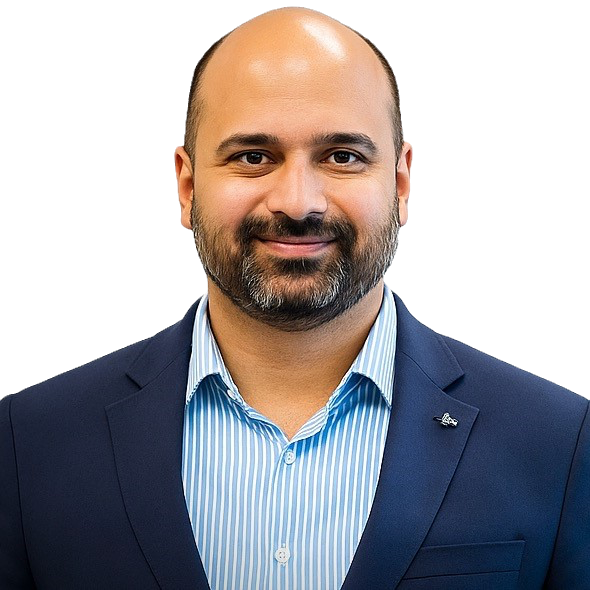Healthcare technology's tribalism problem
- Darren DaCosta
- Aug 15, 2025
- 4 min read
Updated: Sep 15, 2025

Dr. George Noble is a seasoned physician specialising in geriatric medicine. With experience spanning the UK, Bermuda, and now Melbourne, he brings a global perspective on how healthcare systems function and how they might work better. We spoke with him about the realities of digital transformation, the power of gratitude, and what the future of healthcare should feel like.
I’m currently practising geriatric medicine in Melbourne, covering both hospital and community care. My journey has taken me from Kent in the UK to Bermuda and now Australia, where I initially took on what started as a 12-month maternity cover. That’s now stretched into a multi-year tenure, thanks to the ongoing need in the department.
What people often don’t realise is that much of what we label “innovation” in healthcare today is really a reworking of things we’ve already trialled in other settings. The challenge isn’t necessarily inventing the future, it’s spreading it evenly.
What makes you proud to work in healthcare?
There are countless moments. Often it’s as simple as a family member thanking you for looking after their loved one. You realise that just being present, doing a “good enough” job, not perfect, but thoughtful and kind, makes a real difference.
One thing I try to pass on in training is the idea of “gratitude training”. It's about teaching clinicians to receive thanks with grace and warmth. When a relative says thank you, the right response isn't “just doing my job,” it’s “it’s been a pleasure caring for your mum, we’re really pleased with her progress.” That simple change transforms ward culture. It improves morale, patient satisfaction, and teamwork. And it costs absolutely nothing.
What surprises you about your work?
The persistence of tribalism in healthcare. Whether it’s IT systems that don’t talk to each other or hospitals operating independently despite being under the same government, we continue to make the same mistakes.
In Victoria, for example, there’s no unified health IT system. One hospital might use Epic, another Cerner, while others barely contribute to My Health Record. The result is fragmentation, inefficiency, and missed opportunities for integrated care. It’s a lot like the UK in that respect: people clinging to “our way” even when a better collective solution exists.
Also, we often overlook the human factors that drive productivity. We obsess over spreadsheets and outputs, but don’t invest enough in culture, emotional intelligence, and collaboration. That’s a massive missed opportunity.
How would you improve healthcare?
First, by properly integrating existing systems. The data is there, it’s just not joined up. A connected infrastructure could eliminate so much duplication and error.
Second, by focusing on workplace culture. Leaders often focus solely on financial outcomes, but the environments we create for clinicians and staff have a huge impact on performance. When people feel heard, supported, and part of a team, productivity improves naturally.
Finally, we need to stop treating digital tools as silver bullets. Introducing a new system without understanding the real needs and workflows can do more harm than good. Transformation requires a clear vision of the “as is” and “to be”, not just shiny tech.
What’s a common myth or misunderstanding about digital and data in healthcare?
That tech is the solution in itself. It’s not. A Porsche won’t get you to work any faster if the roads are congested or if there’s no petrol station nearby. Likewise, you can buy the most advanced clinical software, but without proper infrastructure, training, and integration, it won’t deliver value.
We also see a lot of decision-making driven by marketing, not clinical need. Vendors sell what they make, not necessarily what’s best for a particular setting. Clinicians are often left trying to pick the “best” solution with limited information, which creates long-term problems.
And people forget about the hidden costs: maintenance, updates, bandwidth. It’s not just the price tag, it’s the whole system that supports it.
Which innovation in health or care are you most excited about?
Clinical decision support. It’s a broad term, some call it AI, but essentially it’s about helping clinicians make better choices in real time.
A good example is how hospitals now handle vital signs. A decade ago, a trained nurse would take a manual blood pressure, interpret it, and maybe escalate care. Now, a clinical assistant presses a button. If the reading is abnormal, the system triggers an alert. That’s clinical decision support in action and it’s saving lives.
The real promise lies in supporting complex decision-making for older patients with multiple conditions. Current pathways often break down for these patients. We need smarter tools that understand nuance and context. That’s where AI, done well, could have a massive impact on outcomes and efficiency.
One book, podcast, or person you’d recommend to others?
Daniel Goleman’s work on emotional intelligence is timeless is foundational for anyone in leadership or team-based environments. I’d also recommend Esther Perel for her insights into relationships. Her work isn’t just about personal life, it’s deeply relevant to workplace dynamics and communication.
More broadly, I’m interested in how we maintain health, not just treat illness. The idea of health maintenance organisations, particularly in the US, is intriguing. Prevention is important though not always appealing. As the joke goes, if you eat nothing but cabbage to live longer, the time just feels longer.
We also need to face up to public health issues. Obesity, alcohol use, lack of preventative care, these are ticking time bombs. We already know the consequences. The question is: are we prepared to act now to prevent what’s coming?



